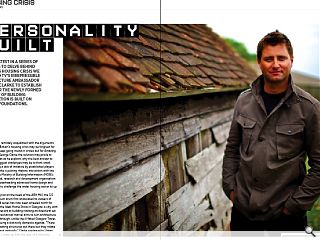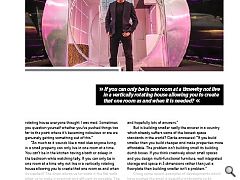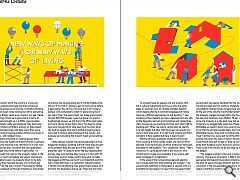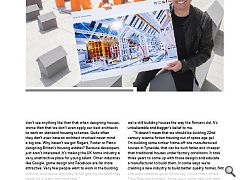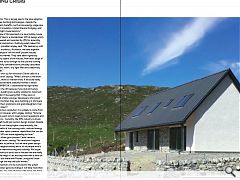Housing Crisis: Personality Built
10 Jul 2017
In the latest in a series of articles to delve behind Britain’s housing crisis we speak to TV’s irrepressible architecture ambassador George Clarke to establish whether the newly formed Ministry of Building Information is built on strong foundations.
Anyone even remotely acquainted with the arguments surrounding Britain’s housing crisis may be forgiven for thinking we keep going round in circles but for Amazing Spaces star George Clarke the solution may prove to be exactly that as he explains why the best answer to one of our biggest challenges may be to think small. Frustrated by a lack of initiative by established players telly man Clarke is putting rhetoric into action with the launch of The Ministry of Building Information (MOBI); an educational, research and development organisation focused on spearheading advanced home design and construction to challenge the wider housing sector to up its game.Following hot on the heels of the ARH Mk1, the 3.5 tonne aluminium drum first showcased to viewers of the Channel 4 series has now been wheeled north for exhibition at the Ideal Home Show in Glasgow, a city with a poor track record at building rotating architectural set pieces. The mechanical marvel aims to turn architecture on its head although, unlike the ill-fated Glasgow Tower, Clarke is pursuing a distinctly domestic agenda. “There are a lot of rotating structures out there but they rotate horizontally, not vertically,” Clarke explained to Urban Realm. When I came up with the idea of a vertically rotating house everyone thought I was mad. Sometimes you question yourself whether you’ve pushed things too far to the point where it’s becoming ridiculous or are we genuinely getting something out of this.”
“As much as it sounds like a mad idea anyone living in a small property can only live in one room at a time. You can’t be in the kitchen having a bath or asleep in the bedroom while watching telly. If you can only be in one room at a time why not live in a vertically rotating house allowing you to create that one room as and when its needed? The drum allows us to rotate it the flat walls allow us to make it practical and efficient as possible. The footprint of the interior is 3m x 3m so you’ve got 9sq/m of usable volume per room but if you times that by four you’ve got a 36sq/m house in a 9sq/m footprint.”
It may look like something which would ferry astronauts to Mars but Clarke is insistent that there is method to his madness, stating: “I’ve had people saying are you going to mass produce these and start selling them to the market? We haven’t set any agenda for it, it’s to inspire the industry to start rethinking about space and different ways of manufacturing affordable homes. We’ve done a one-off prototype to generate lots of questions and hopefully lots of answers.”
But is building smaller really the answer in a country which already suffers some of the loosest space standards in the world? Clarke answered: “If you build smaller then you build cheaper and make properties more affordable. The problem isn’t building small its building dumb boxes. If you think creatively about small spaces and you design multi-functional furniture, well integrated storage and space in 3 dimensions rather than just a floorplate then building smaller isn’t a problem.”
Citing some recent examples of developments which have pushed the small is beautiful philosophy to its extremes Clarke points to the likes of Pocket Living in London which specializes in city centre starter homes for people who would otherwise struggle to gain a foothold on the bottom rung of the housing ladder and The Collective which offers a communal living environment for people who’d rather maintain the social connections. Clarke believes they represent the tip of the iceberg however, stating: “We’re just at the beginning of how creative small spaces can change the way people live.”
Inspired by this approach Clarke is partnering with Teeside University to produce the type of Advanced Home Construction which the country is crying out for to plug a yawning skills gap and draw advanced manufacturing processes to the fore. Innovative thinking of this kind has been sorely lacking but with a worsening housing crisis Britain needs every home it can get. Clarke said: “If anything I think we’re going back in terms of standards. I was brought up in a 1970s-council estate which was actually really well designed, they had some of the best architects in Britain working on that project. It had pedestrianized area, safe play areas. Now we’re building noddy box housing estates without any shops or pubs facilities, with isolated living.
“Any innovative thinking or creative design that’s going to improve the quality of Britain’s homes is going to help alleviate the housing crisis. We think it’s a crisis now but it’s going to be even worse for the next generation, it’s going to get way worse before it gets better. I’m fortunate enough that I got on the property ladder in the 1990s before it went completely and utterly ridiculously crazy. I’ll be able to pass my property down to my kids and hopefully they’ll be able to pass it on to theirs but that shouldn’t be the way it works. The property market shouldn’t be propped up through inheritance. Everybody should have the right to have a decent home.
“Every government over the past 30 years has failed to improve the housing stock and it frankly frightens the life out of me that it’s going to get so much worse before it gets better. We call it a crisis now but it isn’t close to being a crisis compared to what it’s going to be like in ten years’ time. The government can make grand claims to build 300,000 houses a year but there’s no point in building bad houses, we did that in the fifties and sixties and we’re having to tear them down. I’ve been to some new build houses which have been built too fast, dare I say built by people who aren’t skilled enough because we’ve got a massive skills shortage at the minute. Just because we’re building fast doesn’t mean we’re building well.”
Clarke refuses to paint the big housebuilders as true bogeymen however, pointing out that while they are part of the problem they are also part of the solution. The presenter said: “It’s easy to knock the big housebuilders and say they’re all terrible, they’re only in it for profit. Of course they want to make a profit, they want to make the biggest profit they can but it’s an important point for me to make that there is a systematic cultural problem in Britain around planning, how government release land and how the developers are set up - there are too many big developers who dominate the market rather than more small scale entrepreneurial developers.”
To remedy these ills requires not just a policy shift but a cultural realignment to bring us onto the same page as countries such as Canada and New Zealand which despite sharing a common language and history have very different approaches to self-building. “I was studying in New Zealand and saw a development site with all the flagpoles, banners and hoardings and I asked how many houses are you building and they said ‘what? We’re building plot’. When we build a certain plot we specify a certain height but after that the buyer can specify any style or look they want’. It’s a self-build scheme and that’s standard in New Zealand but here it doesn’t exist.”
Rattling off some examples of paucity of thinking from evidence at home Clarke recalls one council which planned 2,500 new houses of which a token ten had been allocated for self-builders. “Ten”, exclaimed Clarke, “That’s ridiculous. It’s up to government s and council s who control land to make more available. If you want a self-build mortgage it’s a nightmare.”
In the wake of the Conservatives general election win is Clarke optimistic that anything will change? “The government published a white paper in January and it is probably the best paper I’ve seen from any government in quite some time”, Clarke said. “It talks about innovation and different modes of funding, it’s the first time the government has openly declared that the housing market is broken and not working. Hopefully when the consultation finishes things will genuinely start to change. At the end of the day the most fundamental thing is the property market has been left to the free market, it has become massively over inflated. 70 per cent of the price of a property is in the land, how did we allow land to become so staggeringly expensive. Properties aren’t affordable we need to build more council houses, we know that the private housebuilders don’t want to build affordable houses, they want to build private houses. I hear it all the time, we’ve got rid of the affordable on another site down the road. It means maximum profits. Government have got to step in, they’ve completely shied away from building council houses as we know them. They’ve left it to industry to do and they’ve avoided it like the plague.
“The biggest problem is the lack of innovation in our industry. The level of innovation in R&D in the automotive, aerospace and telecommunications industries over the past 20 years has been fantastic but the level of innovation in the housebuilding industry is shocking. If Jaguar Land Rover want to release a new car it costs them half a billion pounds in R&D between the initial idea and the finished car rolling off the production line. We don’t see anything like than that when designing houses, worse than that we don’t even apply our best architects to work on standard housing schemes. Quite often they don’t even have an architect involved never mind a big one. Why haven’t we got Rogers, Foster or Piano designing Britain’s housing estates? Because developers just aren’t interested. It’s making the UK home industry a very unattractive place for young talent. Other industries like Google, game design and Facebook are far more attractive. Very few people want to work in the building industry and hence why they’re not getting the skills they need. It’s a really worrying time.”
To pour salt in the wound the technological toolkit available to bring about change has never been broader but the innovative thinking required to make the most of these assets remains lacking. Clarke detailed: “We’ve got all that wonderful; technology and then you go down the road to the mass housebuilding estate being built right now and you’ll see bricklayers taking ages to lay bricks because its pouring with rain. It takes weeks to get a roof on and wind and watertight and ages for the plaster to dry out. It’s ridiculous and antiquated. Apart from improved insulation and better boilers and building regs, we’re still building houses the way the Romans did. It’s unbelievable and beggar’s belief to me.
“It doesn’t mean that we should be building 22nd century science fiction housing out of space age gel. I’m building some timber frame off-site manufactured houses in Tyneside, that can be built faster and cheaper than traditional houses under factory conditions. It took three years to come up with those designs and educate a manufacturer to build them. In some ways we’re creating a new industry to build better quality homes. Not everyone needs to go to University, I think that’s where Tony Blair got it wrong. Some guys, some girls just want to get their hands dirty and make stuff so I think there’s a real opportunity to create a better-quality manufacturing industry for homes with technicians and engineers rather than plasterers and brick layers.”
Structural Insulated Panels (SIPs) is one technology which could reshape the future of housebuilding in the UK but the country still lags in their uptake. John Langley, director of JML Contracts – a building services firm specialising in the sector, explained what role they might play: “… we lag behind the rest of Europe in this construction method and it is not yet widely adopted across the sector. This is largely due to the slow adoption in the UK of new building technologies, despite the greater long term benefits, such as low energy usage due to the excellent insulation, limited thermal bridging, and inherently air-tight characteristics.”
One example of this approach is a new holiday house on the island of Harris, a standardises SIP kit design which was cut, engineered and supplied by JML for assembly on-site by local contractors. Outlining what makes this new approach possible Langley said: “We teamed up with Passive house architects, Architeco, we have together developed a range of ‘off the shelf’ passive houses for the self-build market. They have been rigorously designed, every aspect of the houses, from each stage of construction and build, through to the use and running has been carefully considered and precisely calculated to make efficient, warm, dry, light filled and beautifully practical homes.”
Issuing his own cry for revolution Clarke calls for a ‘housing revolution’ saying: “What’s brilliant is we know there’s a need, there’s a market there. If we build really good quality, sustainable, beautiful homes it would even reduce NIMBYISM. I understand the high-levels of nimbyism in the UK because if you look at the big housebuilders building low quality estates for maximum profit people don’t like seeing that. If they saw co-operatives and smaller younger developers who cared about the communities they were building g in and were affordable for their grandsons and granddaughters I bet they wouldn’t object.”
If there is to be a revolution it is unlikely to come from volume builders however with Langley stating: “Volume builders largely want only to meet current regulations and maximise returns. Currently, the SIPs industry is driven 100% by the self-build and custom design market. Despite the initial build cost being higher comparatively, the long-term benefits of low running costs, reduced energy usage and greater space creation capabilities that can be achieved with SIPs are more appealing to them.”
Despite an often-grim present Clarke remains hopeful for the future, stating: “No revolution happens overnight, unless its political, but we have great design talent, a knowledge economy and a lot of people who’d like to retrain in manufacturing and building. We’ve got a great opportunity to build lots of houses that are really needed, in some ways it’s an exciting time with a little bit of momentum out there with Pocket Living and Urban Splash to change the way we build homes.”
If that momentum is to be nurtured to the extent necessary to foster genuine change it will take more than the efforts of any one individual but with more and more people beginning to speak with one voice on the issue words may soon translate into action.
|
|
Read next: Lost Perthshire: Blasted Past
Read previous: Maquettes: Model Behaviour
Back to July 2017
Browse Features Archive
Search
News
For more news from the industry visit our News section.
Features & Reports
For more information from the industry visit our Features & Reports section.


